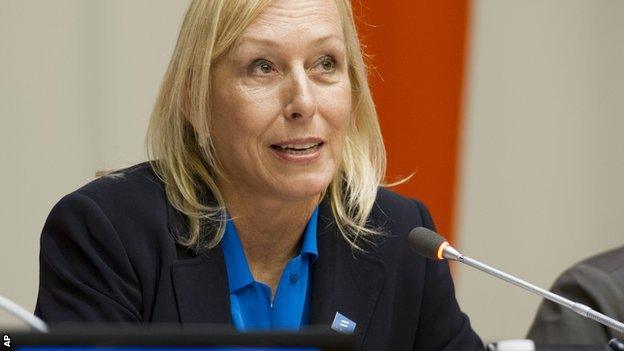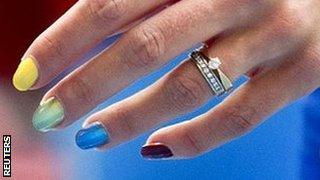Sochi 2014: Martina Navratilova unhappy at IOC gay stance
- Published

Tennis legend Martina Navratilova has accused the International Olympic Committee of "putting its head in the sand" over the issue of gay rights.
February's Winter Olympics take place in Russia, where a law banning 'gay propaganda' was passed this year.
"The IOC needs to stand up better for their athletes," said Navratilova.
Meanwhile, the IOC has warned Olympians against making political gestures in Sochi but plans to set up protest zones for them to "express their views".
Russia has received criticism for its human rights record and for a law it passed in June, which allows for heavy fines to be imposed on those providing information about homosexuality to people under 18.
The Russian government has since provided written assurances that the law will not affect Games participants and spectators.
But Navratilova, who announced she was gay in 1981, remains unhappy.
"I think we can say that sports and politics are inextricably combined - they go hand in hand - and that's where my disappointment was with the IOC," said the 57-year-old American
"It said sports and politics don't mix, which is completely contrary to everything that's been happening.

Swedish athletes Emma Green-Tregaro and Moa Hjelmer painted their fingernails in rainbow colours - a universal symbol of gay pride - during August's World Athletics Championships in Moscow.
"So that's where my disappointment is, more than with anybody else, with the IOC for really putting their head in the sand and not wanting to make any waves."
Navratilova, who won 18 Grand Slams during her tennis career, also criticised football's world governing body Fifa for awarding the 2022 World Cup to Qatar, where homosexual activity is punishable by a jail term.
The IOC plans to warn athletes against taking part in demonstrations or making any political gestures at the Sochi Games.
According to the Olympic Charter, it can expel athletes who violate Rule 50, which states "no kind of demonstration or political, religious or racial propaganda is permitted in any Olympic sites, venues or other areas".
However, the IOC has said the rule would be "interpreted and applied sensibly and proportionately" once athletes and National Olympic Committees had received proper briefings.
New IOC president Thomas Bach has welcomed the idea of 'protest zones' in Sochi, arguing they would allow people to "express their views and freely demonstrate their opinions".
- Published23 August 2013
- Published22 August 2013
- Attribution
- Published11 June 2013
- Published11 December 2013
- Published8 January 2014